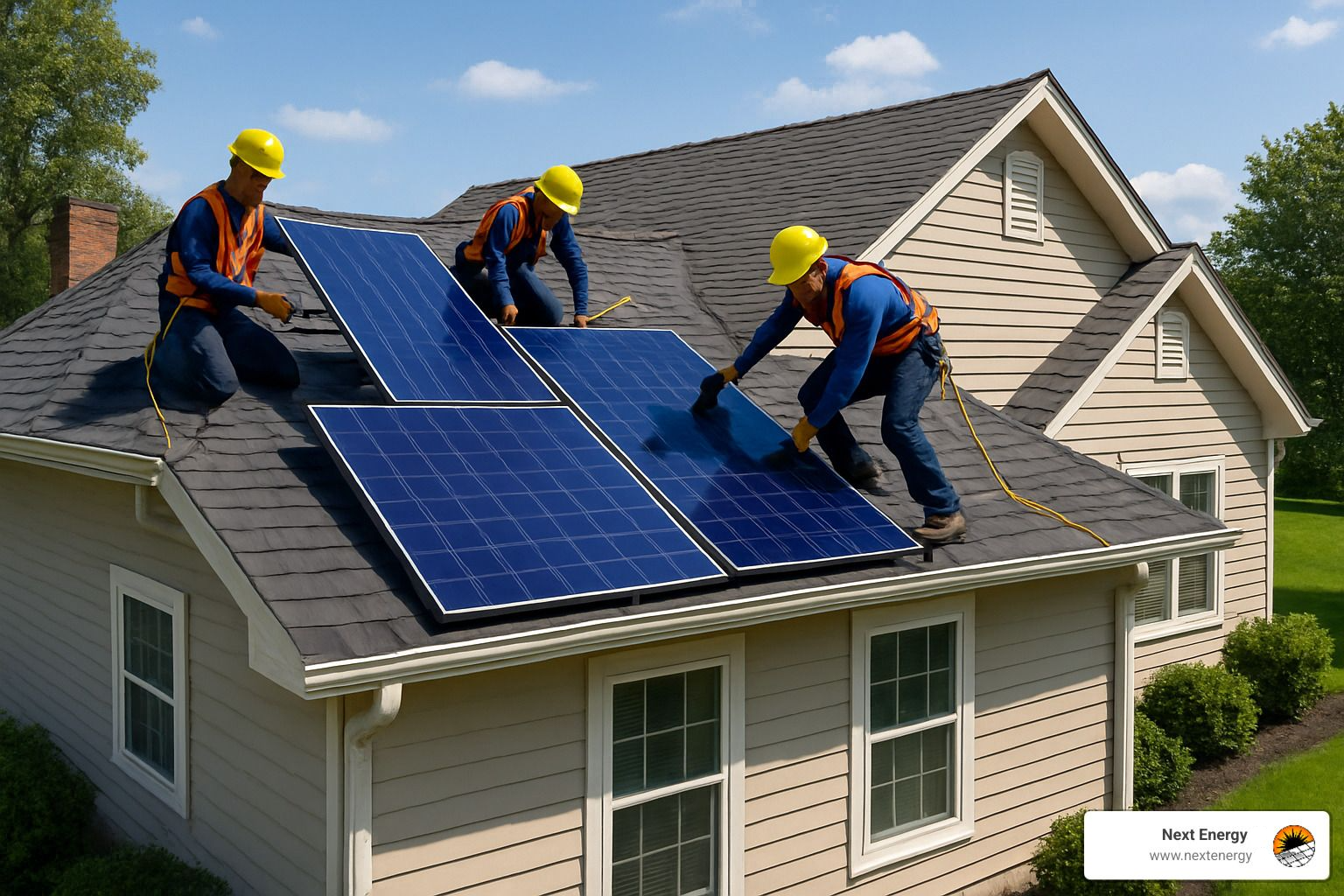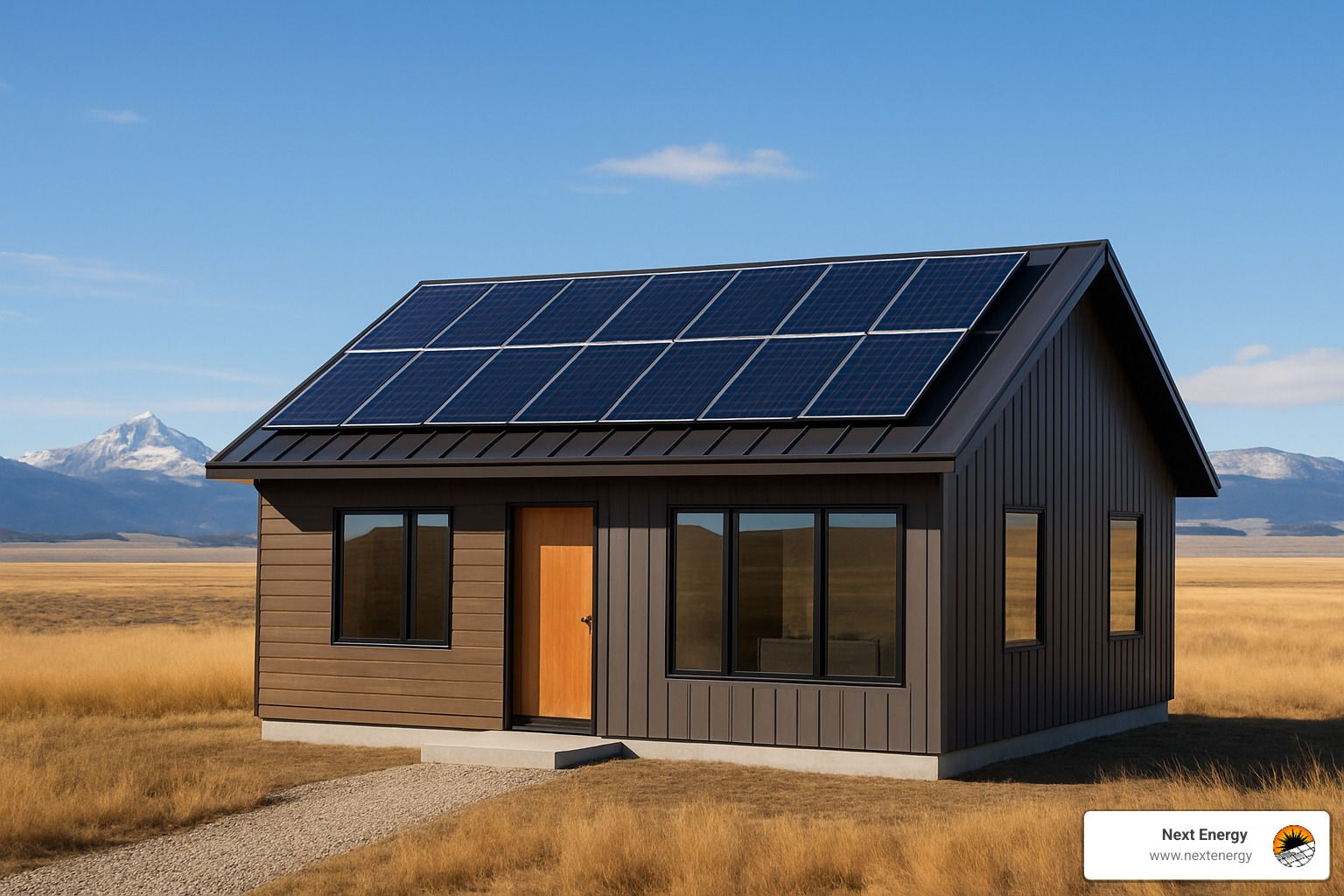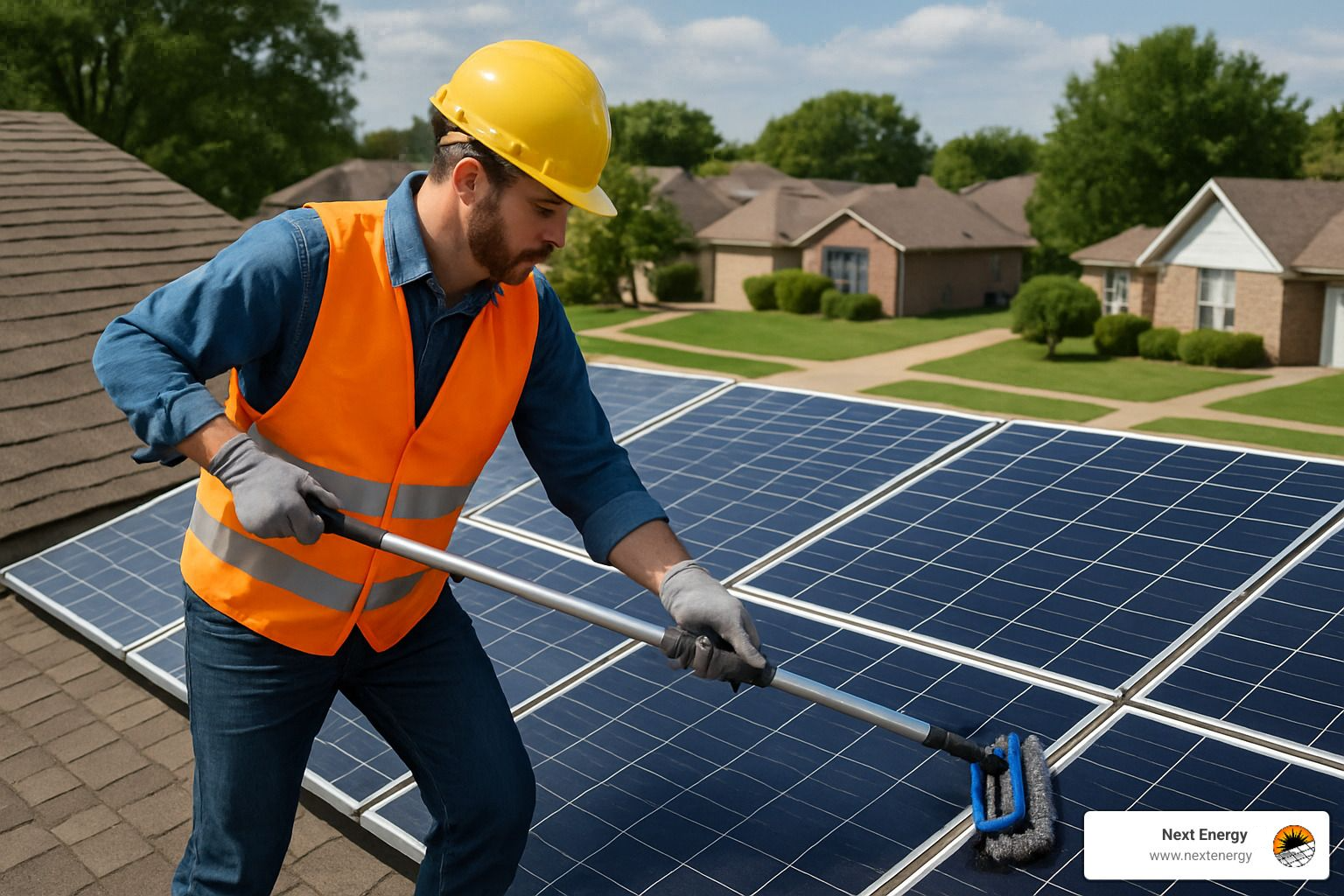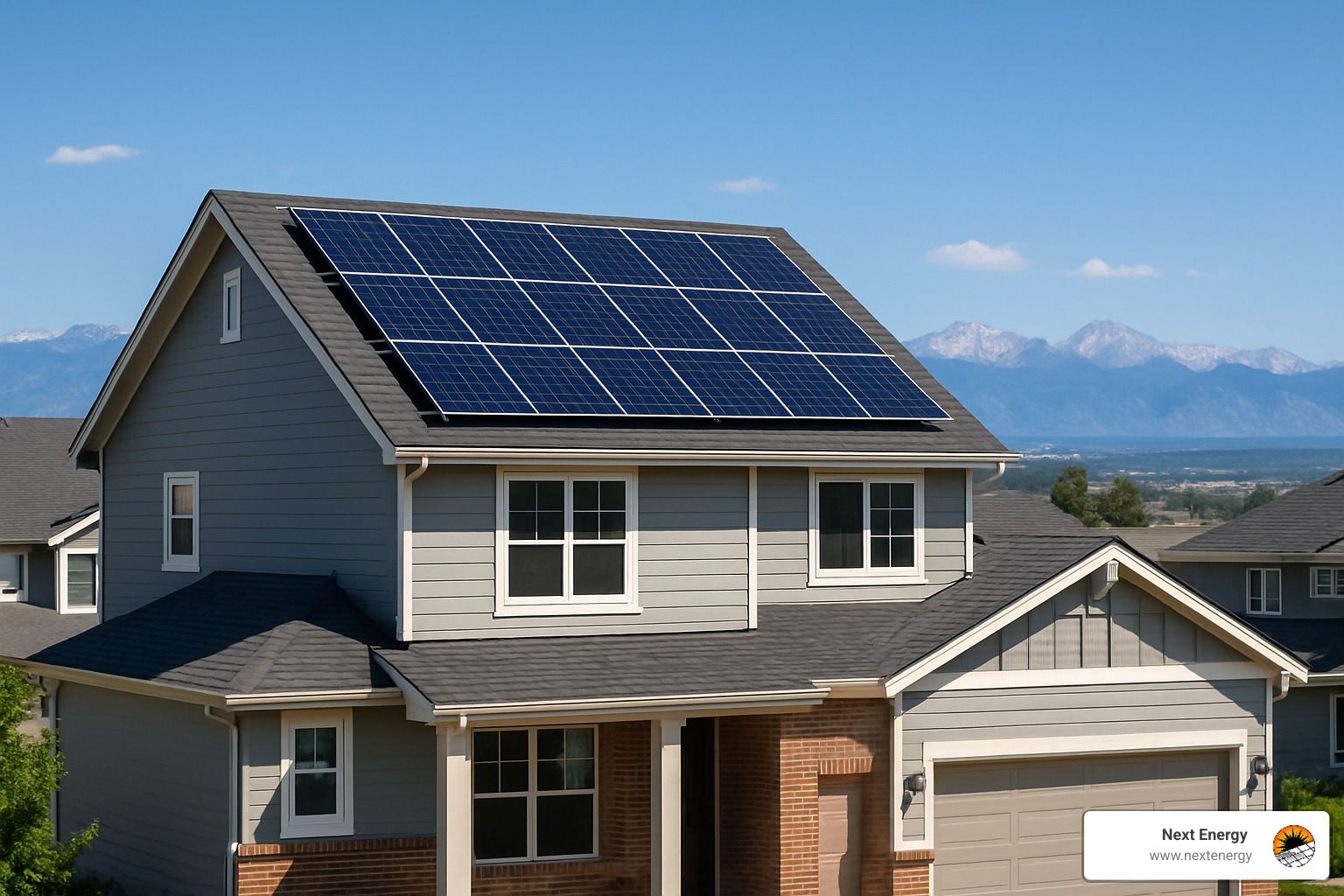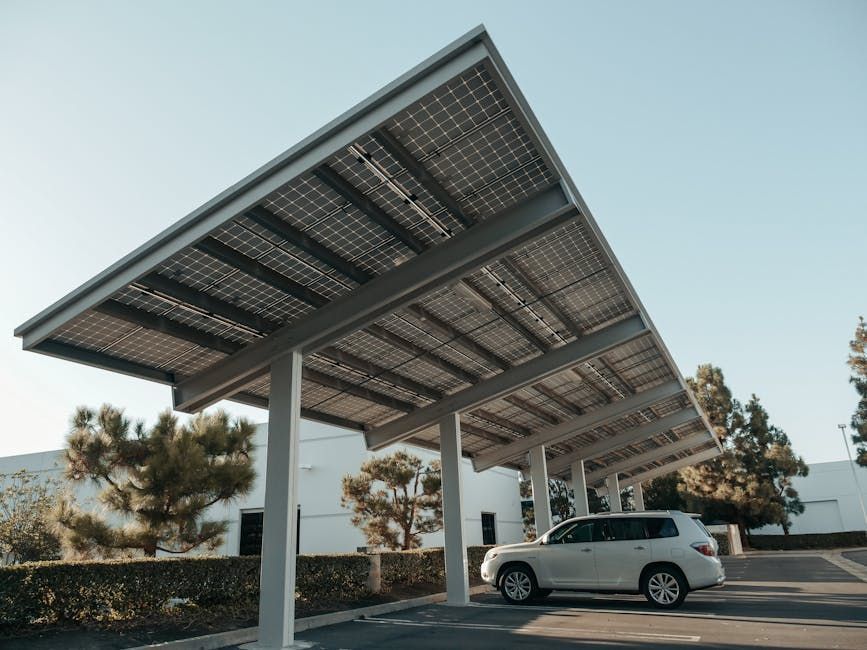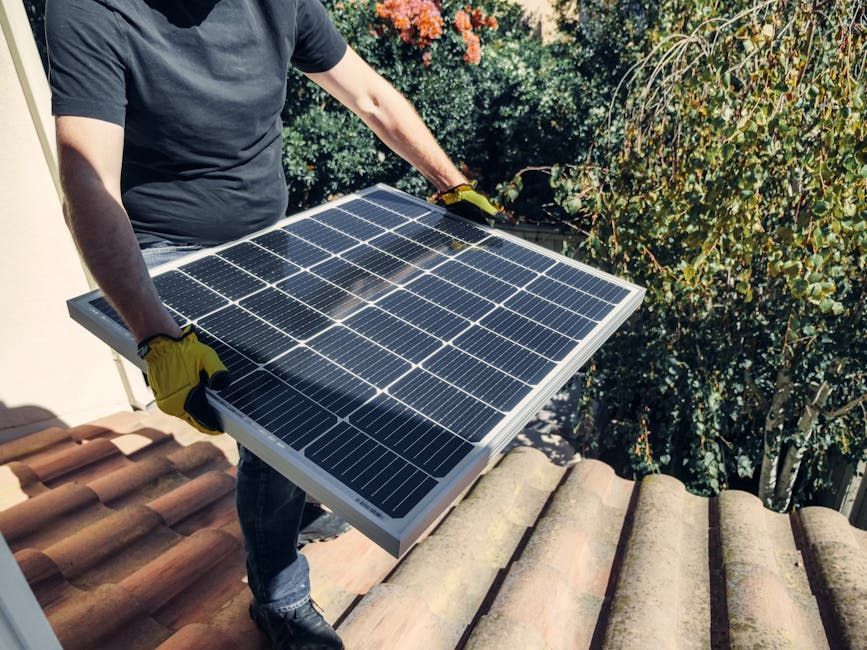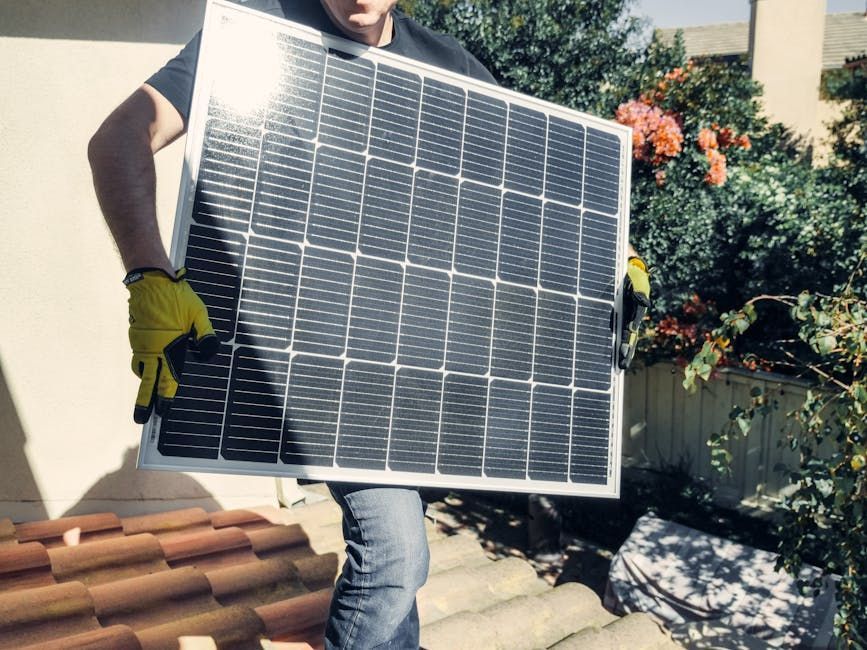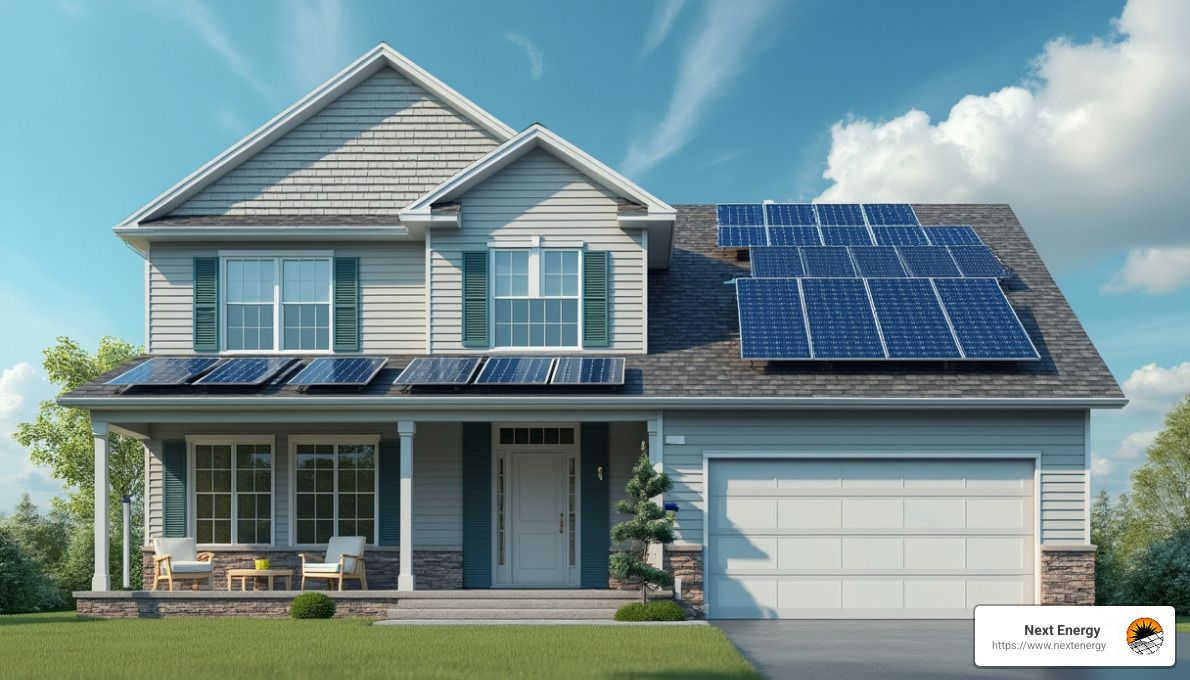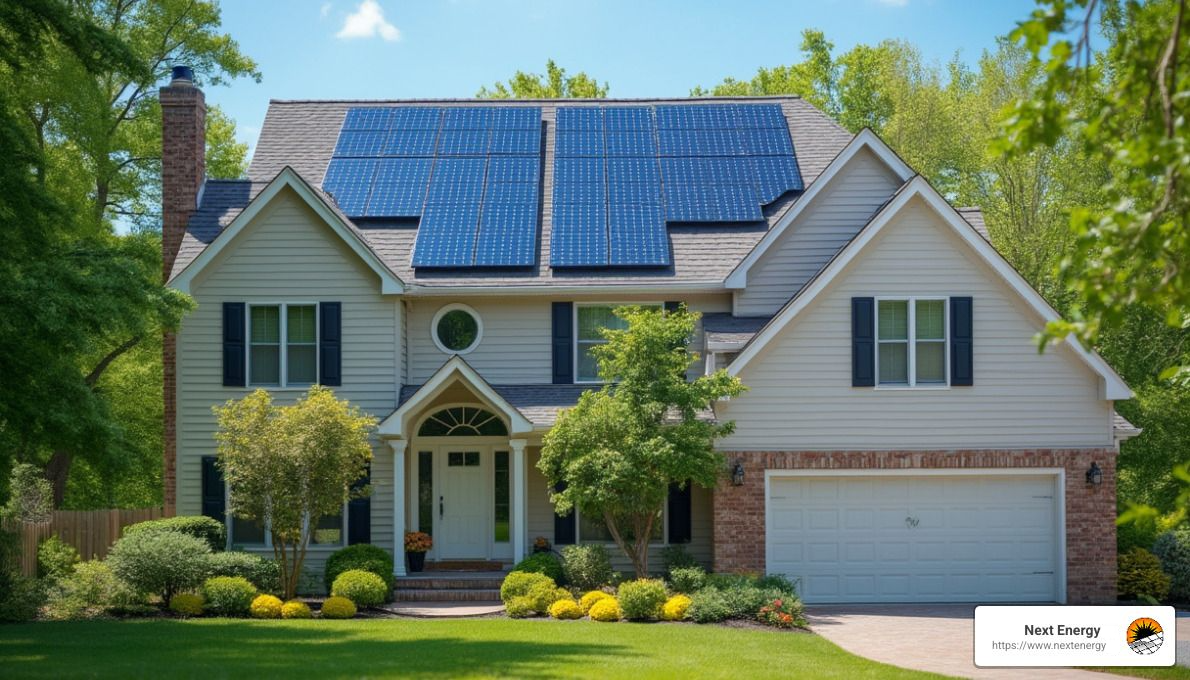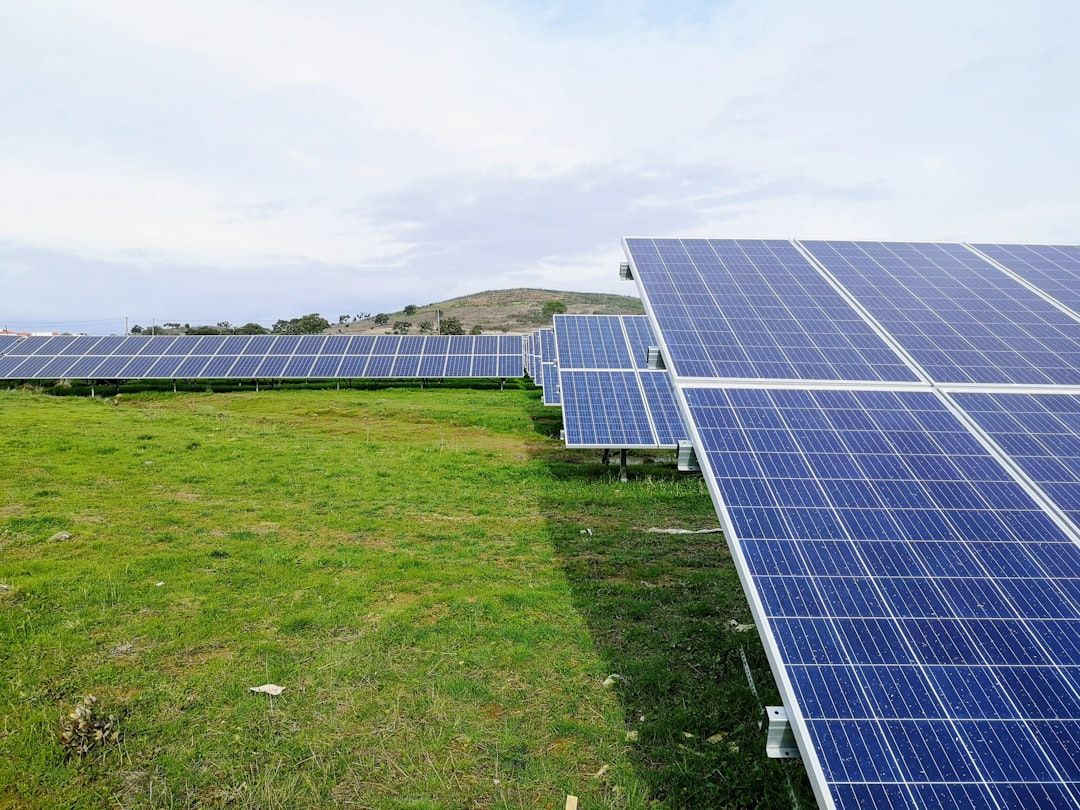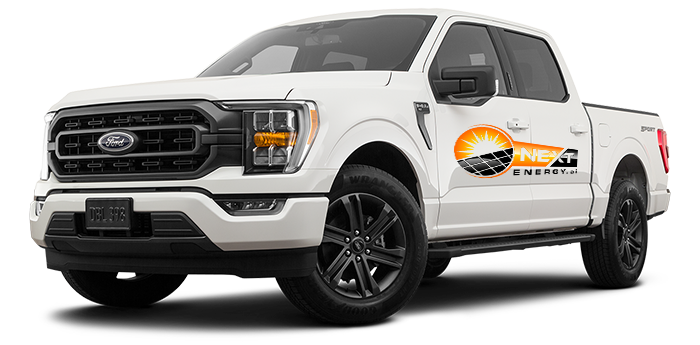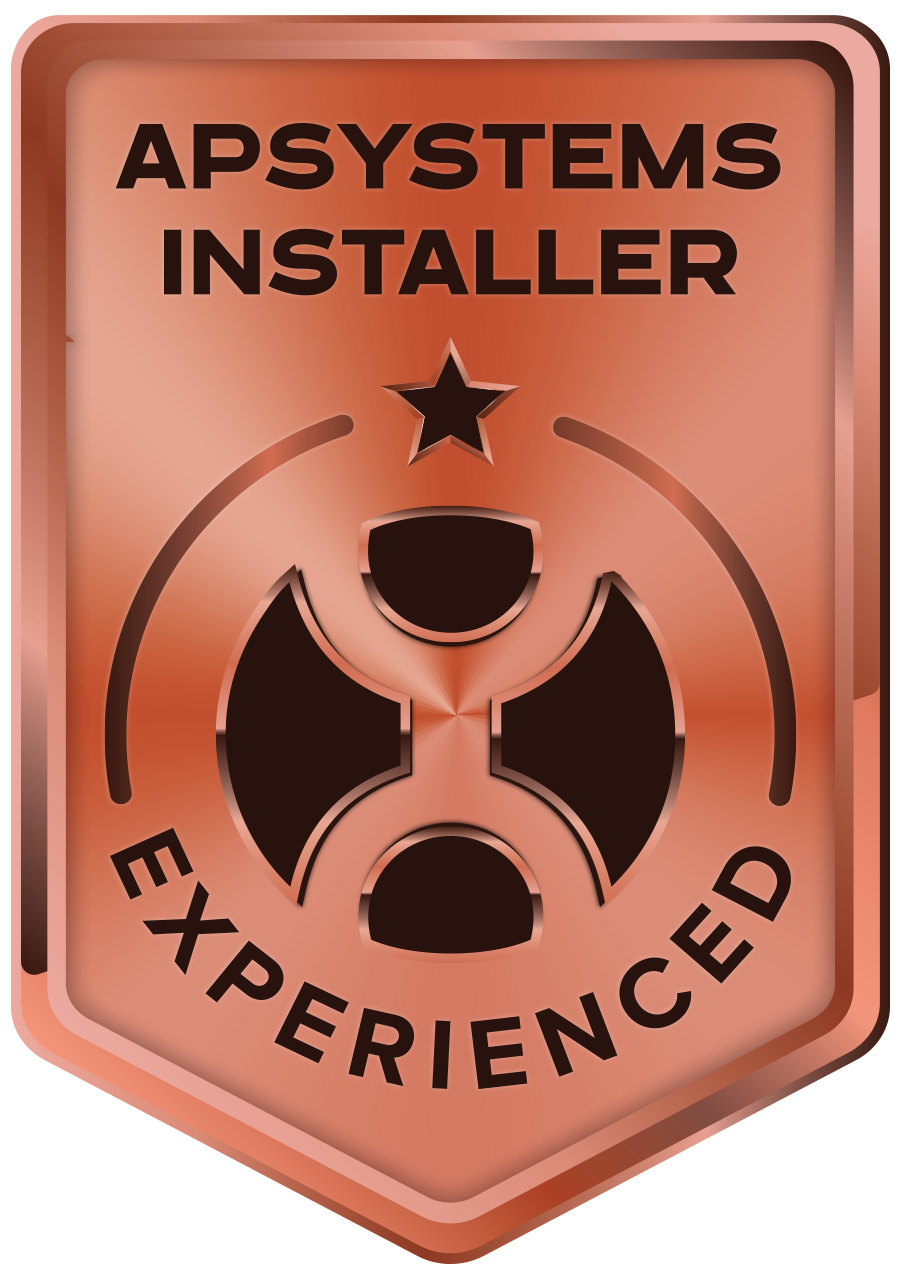Battery Backup Bonanza: Best Options for Your Home
Home battery backup systems have become a pivotal solution for maintaining energy security and achieving energy independence. Where energy costs are rising and power outages are increasingly common, these systems offer eco-conscious homeowners a reliable way to keep the lights on, the refrigerator running, and internet connectivity uninterrupted.
- Key Benefits of Home Battery Backup:
- Reliable Power during Outages: Keep essential appliances running during blackouts.
- Energy Independence: Reduce reliance on the grid by pairing with solar panels.
- Cost Savings: Decrease electricity bills through energy storage and smart usage.
A notable testimony from Phil Robertson, who installed a Tesla Powerwall in Woodstock, Vermont, highlights the peace of mind and convenience a backup system offers: “A storm can mess with a power line, knocking out power for hours, but our Internet, furnace, and refrigerator stay on.”
My name is Spencer Gordon, the CEO of Next Energy. With a background in renewable energy solutions, I've guided many homeowners towards embracing sustainable and efficient charging solutions, ensuring energy independence and resilience for their homes through home battery backup.
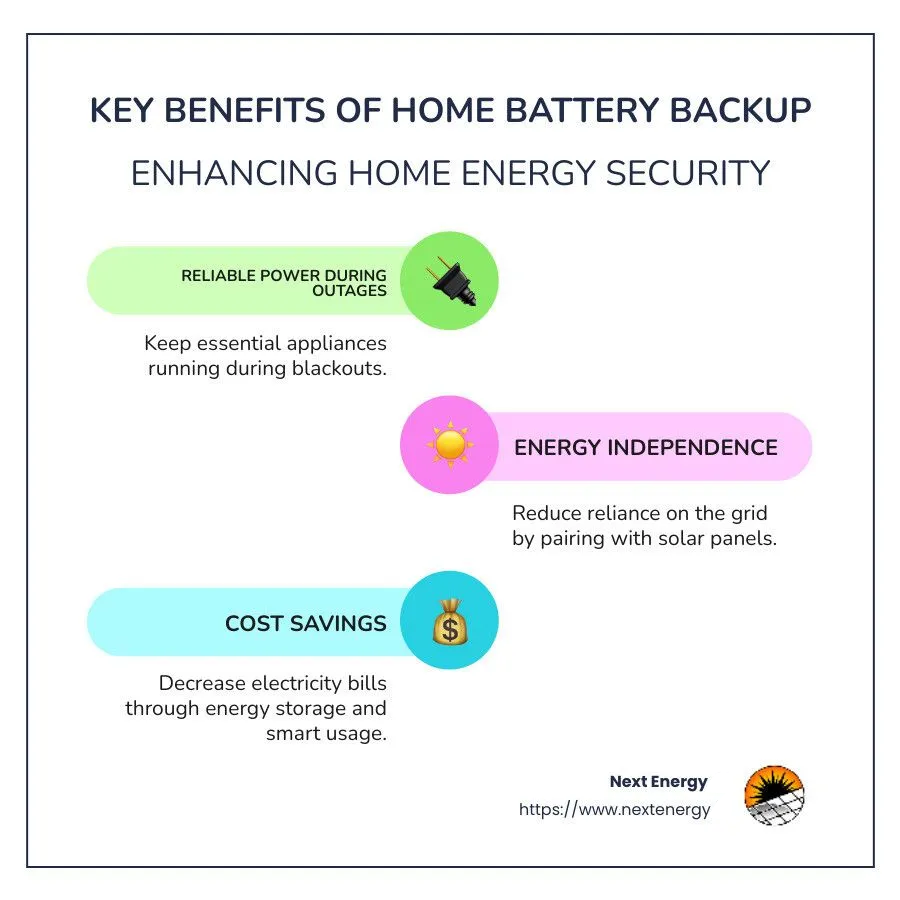
Understanding Home Battery Backup Systems
Home battery backup systems are like the superheroes of modern energy solutions. They swoop in to save the day when the power goes out, keeping your home running smoothly. But how do they work, and what types are available?
Types of Home Battery Backup Systems
When it comes to choosing a home battery backup system, understand the different types available: lithium-ion, lead-acid, and flow batteries. Each has its pros and cons, and the right choice depends on your specific needs.
Lithium-Ion Batteries
Lithium-ion batteries are the most popular choice for home battery backup systems. They are known for their high energy density, which means they can store a lot of energy in a small space. This makes them ideal for homes with limited space.
- Advantages:
- High energy capacity
- Low maintenance
- Long lifespan
- Disadvantages:
- Higher upfront cost compared to other types
These batteries are the same technology used in electric vehicles and smartphones, providing a reliable and efficient energy storage solution. They can cycle thousands of times before their capacity significantly degrades.
Lead-Acid Batteries
Lead-acid batteries have been around for decades and are a more traditional choice. They are generally less expensive than lithium-ion batteries, making them a cost-effective option for homeowners with lower power requirements.
- Advantages:
- Lower initial cost
- Proven technology
- Disadvantages:
- Shorter lifespan
- Requires more maintenance
While they may not last as long as lithium-ion batteries, they can still be a viable option for those on a budget.
Flow Batteries
Flow batteries are the new kids on the block in the home energy storage market. They use liquid electrolytes stored in separate tanks to generate electricity, offering a unique approach to energy storage.
- Advantages:
- Long lifespan
- Easy capacity expansion
- Disadvantages:
- Higher cost
- Emerging technology with limited availability
Flow batteries are still relatively expensive, but their potential for long lifespans and easy scalability makes them an attractive option for the future.
Energy Storage and Solar Panels
Pairing your home battery backup with solar panels is a smart move. Solar panels generate energy during the day, which can be stored in your battery for use during power outages or at night. This combination not only provides reliable power but also reduces your dependence on the grid, leading to potential cost savings on your electricity bills.
Top Home Battery Backup Systems
When it comes to choosing a home battery backup system, the market offers several compelling options. Here, we explore some of the top features and performance aspects of Next Energy's Power Reserve system.
Next Energy Power Reserve
Next Energy's Power Reserve is designed to integrate seamlessly with your home's energy system. This system is not only about storing energy but also about smart energy management. It uses advanced AI to interact with your solar panels, optimizing energy use and ensuring you get the most out of your setup. The Power Reserve offers a user-friendly interface that allows homeowners to monitor energy metrics in real-time, providing a glimpse into your home's energy consumption and savings.
Key Features of Next Energy Power Reserve
- Smart Energy Management: The system's AI capabilities ensure optimal energy use, maximizing efficiency and savings.
- User-Friendly Interface: Homeowners can easily monitor and manage their energy consumption through a real-time dashboard.
- Seamless Integration: Designed to work effortlessly with existing solar panel setups, enhancing overall energy independence.
These features make the Next Energy Power Reserve a standout choice for those looking to enhance their home's energy efficiency and reliability. Whether you're interested in advanced AI integration, ease of installation, or the ability to expand your system, the Power Reserve offers a comprehensive solution to fit your home and lifestyle.
Next, we'll dive into the factors to consider when choosing the right home battery backup system for your needs.
Factors to Consider When Choosing a Home Battery Backup
When selecting a home battery backup system, it's crucial to understand the various factors that can influence your choice. These include capacity, installation requirements, and compatibility with existing systems like solar panels and grid power. Let's break these down.
Capacity and Power Output
The capacity of a battery system is measured in kilowatt-hours (kWh), which indicates how much energy the battery can store. Power output, on the other hand, is measured in kilowatts (kW) and reflects how much energy the battery can deliver at once.
- Capacity: Consider your household's energy needs. A larger family with more appliances will require a higher-capacity battery, which is designed to keep essential systems running for extended periods.
- Power Output: This determines how many appliances you can run simultaneously. If you plan to power high-wattage devices like refrigerators or air conditioners, ensure your system's power output can handle the load.
Installation Requirements
Installation can vary significantly between systems. Some require professional installation, while others are more DIY-friendly.
- Professional Installation: Complex systems often require professional installation to ensure everything is set up correctly and safely. This can add to the initial cost but ensures optimal performance.
- DIY Options: If you're handy, you might prefer a system that offers a plug-and-play setup. This can save on installation costs, though ensure you have the technical know-how to install it safely.
Compatibility With Existing Systems
Your home battery backup should work seamlessly with your existing energy systems, whether you're using solar panels, grid power, or a combination of both.
- Solar Panels: If you have solar panels, ensure your battery system can integrate smoothly. Some systems are designed to work with solar setups, maximizing your solar energy usage without feeding excess power back to the grid.
- Grid Power: Check if the battery can switch between solar and grid power efficiently. This is crucial for maintaining power during outages and optimizing energy use during peak and off-peak times.
Choosing the right home battery backup system involves evaluating these factors in the context of your specific needs and energy usage patterns. By understanding capacity, installation requirements, and compatibility, you can make an informed decision that improves your home's energy independence and resilience.
Cost Analysis of Home Battery Backup Systems
When diving into home battery backup systems, understanding the financial aspects is key. This involves looking at the initial investment, potential long-term savings, and available government incentives and rebates.
Initial Investment
The upfront cost of a home battery backup system can vary greatly depending on the type and capacity of the battery. Generally, costs are measured in dollars per kilowatt-hour (kWh). For example, a high-capacity system might have a significant initial cost, but with federal tax credits, this price can drop significantly.
- Cost per kWh: This is an important metric to consider. A higher cost per kWh usually indicates a more advanced system with greater storage capacity or longer lifespan.
- Installation Costs: Don’t forget to factor in installation costs. Professional installation can add to the total cost but ensures the system is set up correctly and safely. For systems like those offered by Next Energy, professional installation is often necessary.
Long-Term Savings
Investing in a home battery backup system can lead to significant savings over time, primarily through reduced electricity bills and efficient energy use.
- Electricity Bills: By storing energy when it's cheap and using it during peak demand times, you can lower your electricity bills. This is especially beneficial in areas with time-of-use (TOU) pricing, where electricity costs vary throughout the day.
- Peak Demand: Systems like those from Next Energy allow homeowners to manage energy use effectively, reducing the amount of expensive peak electricity they need from the grid.
Government Incentives and Rebates
Government incentives can significantly offset the cost of installing a home battery backup system. These include tax credits and rebates, which are often available at both federal and state levels.
- Tax Credits: The federal investment tax credit (ITC) can cover up to 30% of the installation cost for solar-plus-storage systems. This can make systems much more affordable.
- Rebates: Some states offer additional rebates. For instance, California’s Self-Generation Incentive Program provides substantial rebates for residential storage systems.
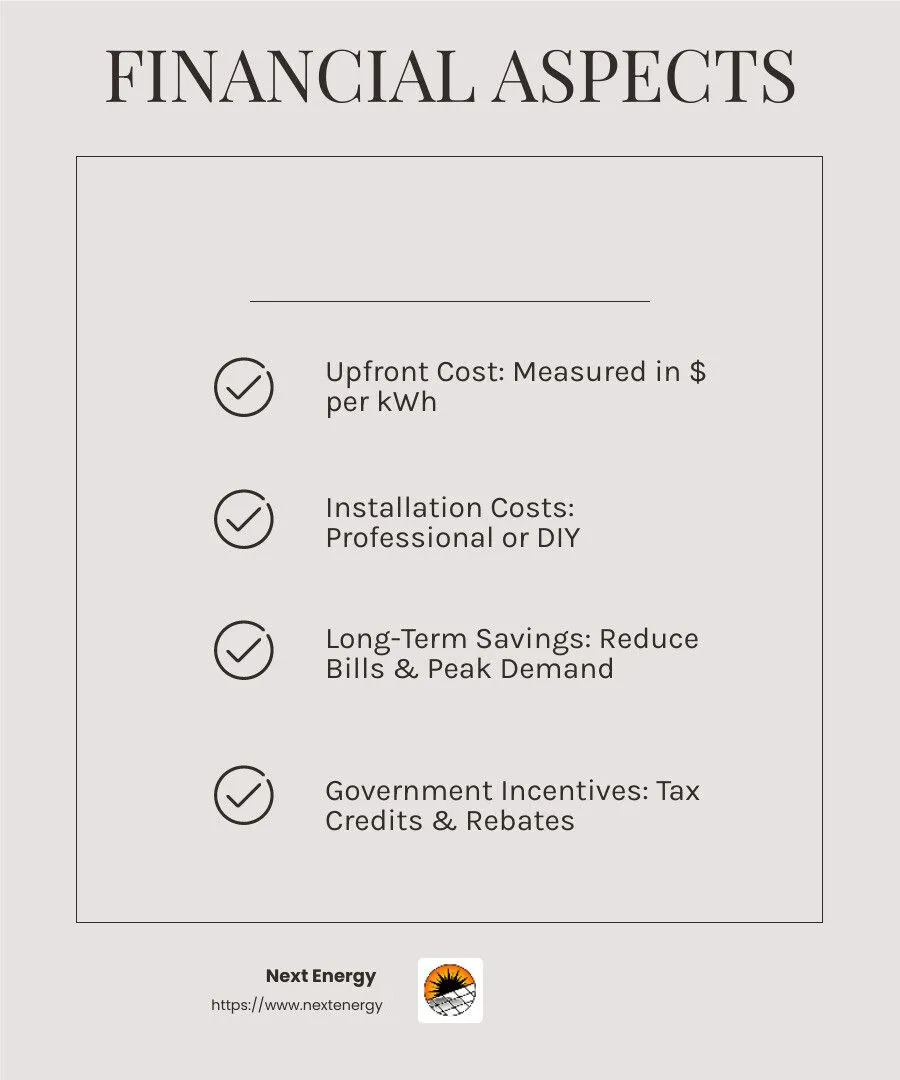
Understanding these financial elements helps you make an informed decision about investing in a home battery backup system. By considering the initial investment, long-term savings, and available incentives, you can better assess the true value and affordability of these systems for your home.
This leads us to the next section, where we'll explore the benefits of home battery backup systems, including energy independence and protection against power outages.
Benefits of Home Battery Backup Systems
Investing in a home battery backup system offers more than just financial savings. These systems deliver key benefits that improve your home's energy resilience and efficiency.
Energy Independence
Imagine generating your own power and reducing your dependence on the grid. A home battery backup system, especially when paired with solar panels, allows you to store excess energy generated during sunny days. Use this stored power at night or during cloudy periods, minimizing your reliance on utility companies. This can be particularly empowering in areas with frequent power outages or high electricity prices. As more homeowners seek energy independence, the demand for such systems is expected to grow, with the market potentially reaching $120–$150 billion by 2030.
Protection Against Power Outages
Power outages are more than just inconvenient—they can disrupt your daily life. A home battery backup system ensures that essential appliances like your refrigerator, heating, and communication devices remain operational during an outage. This is crucial during extreme weather events, where maintaining access to these systems can significantly improve your comfort and safety. As one expert noted, having a reliable battery backup can be a "lifesaver" in emergencies, offering peace of mind when you need it most.
Potential for Lower Electricity Bills
By using your battery to store energy when it's cheap and deploying it when grid prices spike, you can effectively manage and reduce your electricity bills. This strategy is especially beneficial if you live in a region with time-of-use pricing. For example, systems like the Flex Energy Storage allow you to optimize your energy usage and reduce reliance on expensive peak electricity. Additionally, some homeowners can even sell excess stored energy back to the grid, further offsetting costs.
In summary, a home battery backup system not only provides financial benefits but also improves energy security and independence. We'll address some common questions about these systems to help you make the most informed decision for your home.
Frequently Asked Questions about Home Battery Backup
How much does a backup battery cost for a home?
The cost of a home battery backup system can vary significantly based on the type and capacity of the battery you choose. On average, a good-quality lithium-ion battery costs around $9,300 before installation. Installation costs can add several thousand dollars, as professional setup is typically required. This brings the total initial investment to anywhere between $10,000 to $15,000, depending on specific needs and installation complexity.
When evaluating costs, it's helpful to consider the cost per kilowatt-hour (kWh) of storage. For lithium-ion batteries, this typically ranges from $600 to $1,200 per kWh. Government incentives and rebates can significantly offset these costs, making these systems more affordable.
How long does a home battery backup last?
The lifespan of a home battery backup system depends on the type of battery used. Lithium-ion batteries are the most common and typically last 10 to 15 years, with manufacturers guaranteeing at least 70% capacity retention over a 10-year period. These batteries can cycle thousands of times before their capacity significantly degrades.
Lead-acid batteries, while cheaper, generally have a shorter lifespan of about 5 to 7 years and require more maintenance. Flow batteries are gaining attention for their potential longevity, lasting over 15 years, but they are still relatively expensive and less common in residential settings.
What is the best type of battery for home backup?
Choosing the best battery type for your home battery backup system depends on your specific needs and budget. Here's a quick comparison:
- Lithium-Ion Batteries: These are the most popular due to their high energy density, long lifespan, and low maintenance. They are ideal for most homeowners who want a balance of performance and cost.
- Lead-Acid Batteries: These are more budget-friendly and suitable for homeowners with lower power requirements. However, they have a shorter lifespan and need regular maintenance.
- Flow Batteries: Although currently more expensive, they offer a promising option for those looking for easy capacity expansion and longer lifespan. Their unique design allows for more flexible energy storage solutions.
In conclusion, lithium-ion batteries are generally the best choice for most homeowners, offering a good mix of longevity, efficiency, and ease of use. However, the right choice will ultimately depend on your energy needs, budget, and willingness to invest in newer technologies.
Conclusion
As we wrap up our exploration of home battery backup systems, it's clear that these systems are not just a luxury but a smart investment for the future. At NextEnergy, we are committed to helping you achieve energy independence and optimize your energy management with our AI-improved solar solutions.
Next Energy: Leading the Charge in Energy Management
Our focus at Next Energy is on changing how you use and store energy. By integrating advanced AI technology, we optimize your energy usage, making your solar panels work smarter, not harder. This means you can store excess solar energy efficiently, reduce reliance on the grid, and enjoy lower electricity bills.
Future Trends in Home Energy Storage
The future of home energy storage is bright, with significant growth and innovation on the horizon. Analysts predict that the home energy storage market will more than double in size by 2030, reaching a market value of $120–$150 billion. This growth will likely drive down costs and make these systems more accessible to homeowners.
Emerging technologies like solid-state batteries and sodium-ion batteries promise to offer even more efficient, safe, and reliable energy storage solutions. These advancements will continue to reshape the landscape of home energy management, providing more options and better performance for homeowners.
Accept the Future with Next Energy
At Next Energy, we believe that the future of energy is clean, sustainable, and intelligent. Our solar solutions are designed to empower you with the tools you need to take control of your energy usage and contribute to a greener planet. If you're ready to explore how a home battery backup system can benefit your home, contact us today to learn more about our custom solar solutions.
Together, let's power the future with clean, renewable energy.
